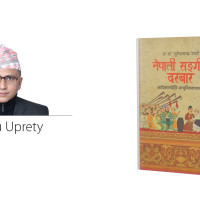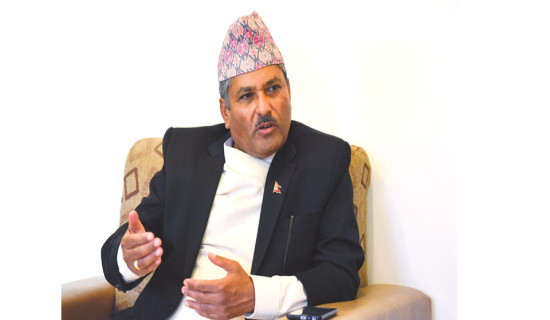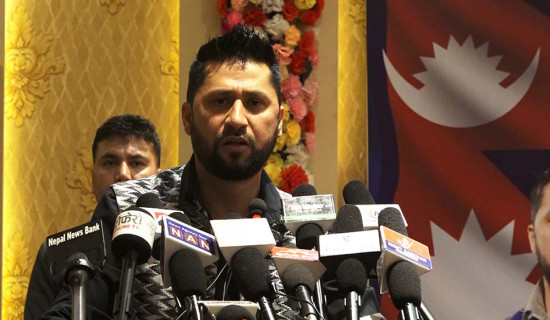- Saturday, 27 April 2024
Poems of Hope and Positivity: The Poetic Burden and Other Poems

Sushant Kumar B.K.
Sushant Thapa, a Nepalese noteworthy poet-friend from Biratnagar
, Nepal has already introduced three collections of poetry: Minutes of Merit,
Abstraction and Other Poems, and The Poetic Burden and Other Poems.
He is currently planning to publish his fourth poetry book by World Inkers
Printing and Publishing, New York, USA.
But today, I'm reviewing his debut collection of
poems, The Poetic Burden and Other Poems. Since he has already published
three anthologies of poems, including the debut one, In the process of writing,
my intrusive self-wonders, "Why do I review his debut anthology while
neglecting the other of his two recent anthologies? At that moment, I
realized that books are neither old nor dead. They can constantly be viewed
from a variety of angles, and numerous interpretations can also be offered.
The imperative facet of my review for this debut
anthology is to employ the poems as windows through which I can discover the
poet's sheer strengths and good abilities despite being a budding poet at the
time the anthology was written. Therefore, let's start by discussing the blurbs
of the book. Book blurbs often play a
crucial role in selling books. As they attract readers to buy books since smart
readers generally start by reading the books’ blurbs prior to purchasing them.
In this regard, Thapa’s debut book is rich enough that contains eight blurbs written
by globally renowned authors and poets. They are as below:
Professor Saugata Bhaduri-
Centre for English Studies, Jawaharlal
Nehru University, New Delhi, Yuyutsu Sharma - author of Annaurna Poems and A
Bizzard in my Bones: New York Poems, Dusticn Pickering- Founder and editor at Transcendent Zero Press
and Harbinger Aslum; Hoston, Texas, USA, Mahes Paudyal - Poet and Critic,
Central Department of Tribhuwan University,Kathmandu, Nepal, Gopal Lahiri - Poet
and Critic, Kolkata, India, Dr. Tulsi Acharya- Assistance Professor of English
At South Georgia State College, USA, Jarle Sanden- Retired Managing Director of
Romsdalmuseet, Molde, Norway.,Mia Savant,- Creator of Literary blog Ponder
Sawant, USA have opined their perspectives as blurs about the book.
As a critical reader of literary
works, I discover such similarity is with Barack Obama's book, "The
Audacity of Hope," as well. Also, it features ten blurbs that are
written by great personalities and global national dailies: Joe Klein-The
Times, Simon Jenkins- Sunday Times, Spectator, Oona King- The
Times, Sunday Times, Guardian, Washington post, New
Statesman, Observer, Independent.
Countless authors and newspapers have contributed
blurbs for the book, The Audacity of Hope in response to Obama's prior
literary work, an autobiographical novel called Dreams From My Father, and
his position as the president of the USA. The same fate has occurred to be for
Thapa's debut poetry collection, The Poetic Burden and Other Poems, His
habit of writing frequently, beautiful poems or stimulating articles motivated
global authors and poets to pen blurbs for his debut anthology. Here, his
strengths and abilities are reflections of his habits.
Yet again, my analytical
thinking wonders why such widely esteemed authors and poets contributed blurbs
to the book then. I explore that, by publishing poems and articles on national
and international platforms before the book's release, the poet had already established
his repute as a poet and the writer at the pinnacle of literature.
I also discovered that the title poem, "The
Poetic Burden," appears on page 85 and it is numbered 67 when reading
poems in this book, whereas the poem “Let Your Fiction Flow” is numbered
1. Despite the fact that the book's title poem is usually placed on the first
page. Why did the budding poet, Thapa choose to do so then? The answer is: comparatively,
the poem” The Poetic Burden” is more psychological and the title itself
is poetic in nature that general readers or citizens could feel difficult to comprehend
its essence and sense but the poem “Let Your Fiction Flow” looks less
connotative and easy to grasp even though we all assume that no poetry often contains
ordinary language, the poet appears to be aware of how comprehensive the poem
should be for general readers here.
“With a soothing flow;
And an imaginative glow
A poem comes in between
words and is
Always a delight to
uncover words and know
Drenched in the burden to
compose
Nothingness is viewed
from a lens sometimes too verbose
Passion and politics
Nature and mankind
Shame and anguish
Can all rest below one
topic and roof
Figures and figurative
languages are s
Slipped slowly like tea
From life’s cup…”” (The
Poetic Burden).
The poem "The
Poetic Burden" is where the aforementioned lines are taken from. In
fact, figuring out the poem's hidden meaning here could be perplexing for (general)
average readers. Does the poet truly think that composing poetry is a burden?
Undoubtedly not, Even though the word
"burden" has a negative meaning that generally refers to a worry or
problem but according to the Oxford Advanced Learner’s Dictionary(9th
Edition)- “ Burden” means –(n)-“ a duty or responsibility, etc. that causes
worry..”. Mind it, a duty and one should not take it as a problem, so, connotatively,
the poet's burden is to ever be pleasant. He sees significance within it. The poet
enjoys carrying out his duty regarding abstractions, analogies, and metaphors that
are challenging to use in a meaningful way while crafting poems.
“… Your fiction which is
real
Let them feel
The power of the heal
It is your words just
wield
The folly critics should
not make you yield”( Let Your Fiction Flow)
The lines from the poem
"Let Your Fiction Flow" that have been mentioned are more
denotative than connotative. Even the general readers could understand it with
ease. Apparently, he might have thought that a difficult reading always lacks
its aesthetics, essence and meaning. So he purposely sets the poem on the first
page to lure all types of readers through simplicity of its language.
Here, the poet also
promotes the idea of writing self-stories (fiction). It is a process of healing
oneself similar to script therapy, or script therapy itself; a therapeutic
method in which mentally disturbed people have to write everything and anything
to release traumatic feelings from within. That way, the poet correspondingly
creates hope in our hearts, and if hope should be the first and foremost thing
in one’s life, then why not a positive and hopeful poem should be in the first
place or on the first page?
So, the poet appears to
be wise enough in placing both poems in their respective places as they are
numbered in the book.
Most of the poems in any
anthology are normally composed over a period of years, at least within one
year, and during such years, the poets may frequently change perspectives on
everything or something and then they attempt to express such changes through
poetry. Sometimes they express their rage, malice, somberness, hatred,
ambiguity, and dualism; however, Thapa's poems take a stand on one point which is
profound hope in life, even if he falls or fails. His poems find hope in life
in any circumstance, and find light even in the darkest of times.
His poems remind the
readers of the play Waiting For Godot by Samuel Backett. Here, Vladimir
and Estragon, the two people, keep on waiting for the arrival of Godot. But
Godot never appears. But they (Vladimir and Estragon) keep on holding onto
their faith and hope.
Most of the poems in this anthology reflect tremendous hope and encouragement in some way, either at the beginning or at the end. For instance, the poet looks optimistic about life in the poem "The Choices." He argues that while there is darkness and the possibility of awful times, there is also brightness, and individuals have the choice. As we are all aware that during the COVID-19 pandemic, which had a disastrous impact on everyone's life and society, thinking positively about life seemed impossible to everyone. But the poet, through his poem "Writing on the Broken Wall" says that one should value both: night and day, as night is the source of day. It comes only after the night. In the same way, the poet believes that the pandemic has done something good for human beings too; that it has restored "lost" humanity in this so-called materialistic and calculative world.
Since this book
ultimately offers optimism in the face of gloom or hardship, I would like to
name the poet Mr. Hope. I also highly recommend it to give a read to those who
are experiencing hopelessness or failure.
( B.K. is a Nepali poet, translator, educator, and freelance writer who is from Gulariya, Bardiya, Nepal. He especially writes poems in English and Nepali languages. His poems have been featured in national and international anthologies, magazines, newspapers, and online portals. He can be reached at sushantacademia@gmail.com.)













-original-thumb.jpg)


